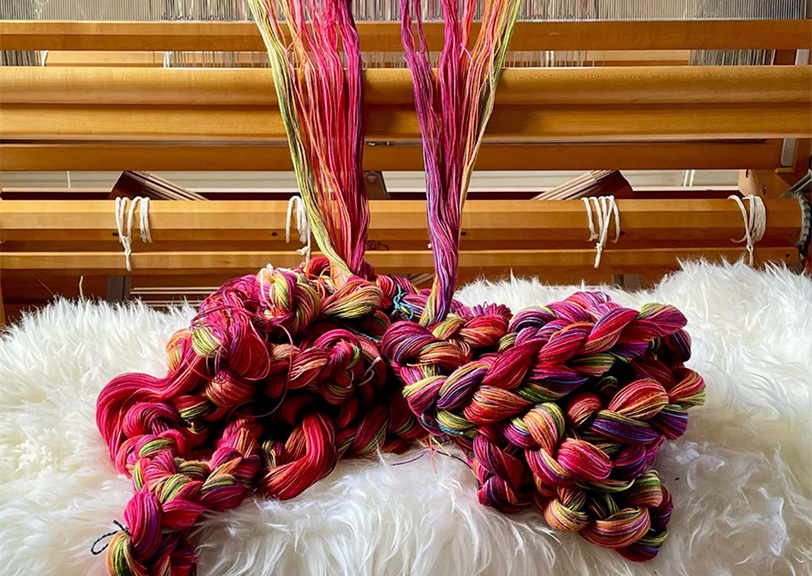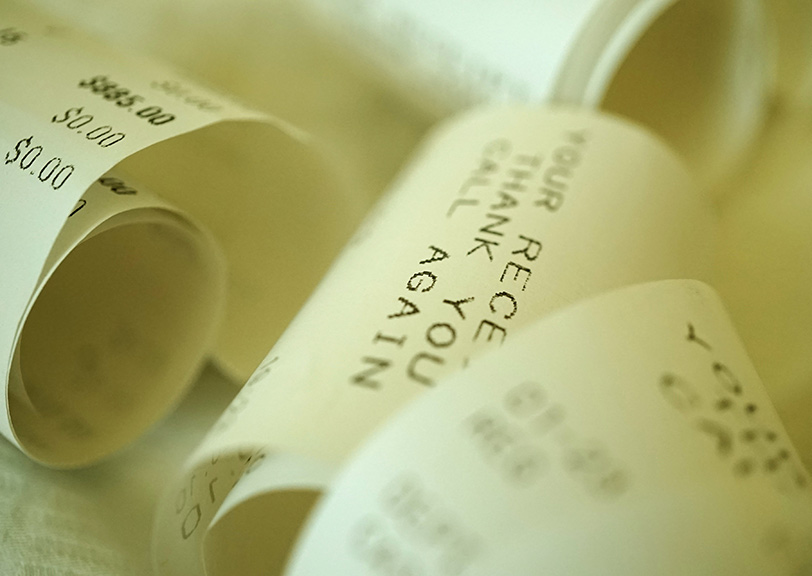ENTER YOUR EMAIL TO RECEIVE OUR WEEKLY NEWSLETTER
I’ll Never Forget … Judy Garland, Carnegie Hall
The energy was powerful—and palpable—during this “greatest night in show-biz history”
By Ellen Freed
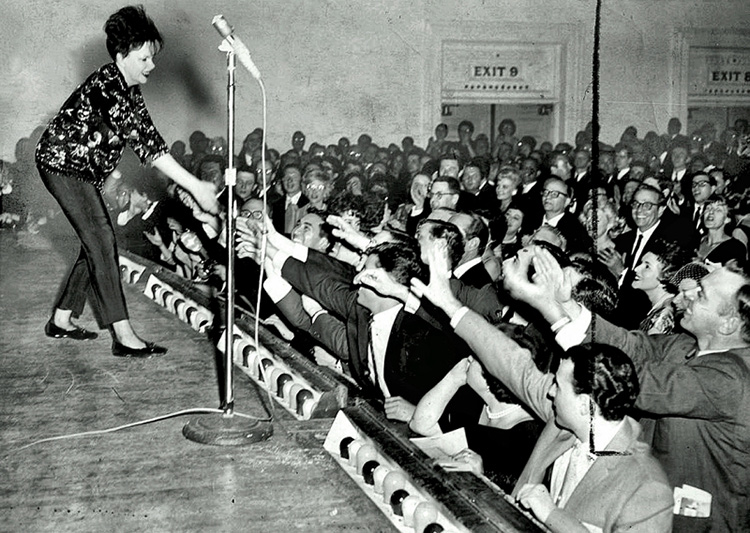
Reaching out: Judy Garland at Carnegie Hall, April 23, 1961—a momentous show biz event.
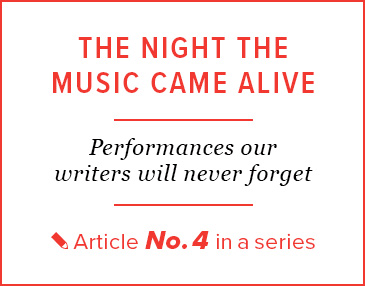 October 31, 2023
October 31, 2023
A college friend invited me to Judy Garland’s highly publicized April 23, 1961, Carnegie Hall concert, which sold out the day tickets were issued. The success of this event is reflected in an album recorded live, which remained on the Billboard charts for 73 weeks, including 13 weeks at No. 1. It won four Grammy Awards, was certified gold, and has never been out of print.
And we were there “in the room where it happened”—two very fortunate Manhattan-based recent college graduates who were about to experience “the greatest night in show business.” Because my friend’s brother-in-law was Burt Boyar, a major entertainment journalist, we ended up sitting smack in the center of the third-row orchestra—an area usually occupied by A-list notables. Seated nearby were the celebrated pop-music composer Harold Arlen (who wrote the songs for The Wizard of Oz, among many other Garland hits) and the gossip columnist Louella Parsons, while Ethel Merman, Benny Goodman, and Rock Hudson were in the front row. I later learned that such Hollywood legends and Broadway stars as Mickey Rooney, Julie Andrews, Marilyn Monroe, Debbie Reynolds, Myrna Loy, Bette Davis, Spencer Tracy, Katharine Hepburn, Henry Fonda, Richard Burton, Carol Channing, Lauren Bacall, Mike Nichols, and Elaine May were also in attendance—and that’s just naming a smattering. It was exciting to be surrounded by such luminaries!
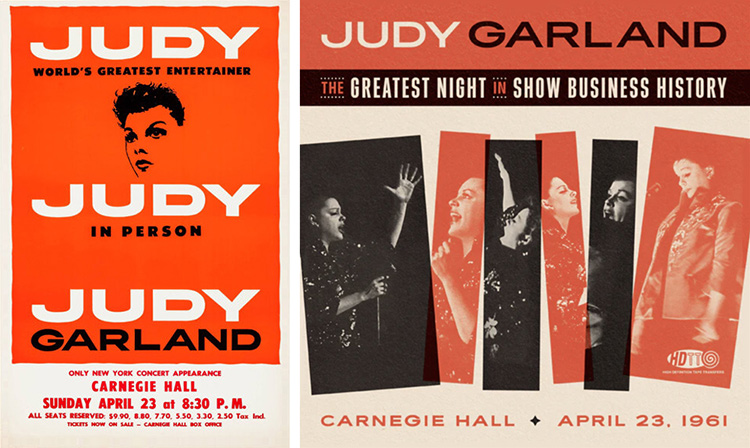
Poster and album cover art: Commemorating the Carnegie Hall performance. (Remember LPs?)
. . . . . . . . . . . . .
The moment Garland appeared onstage, over 3,000 fans welcomed her with cheers, loud applause, and a standing ovation—and she hadn’t even started singing yet. I remember feeling surrounded by the powerful energy of this amazing audience response—one that would frequently be repeated throughout the concert.
Garland then proceeded to perform 26 songs from her repertory, including “Over the Rainbow,” “The Man That Got Away,” and “The Trolley Song.” I specifically recall her quiet rendition of “If Love Were All,” sung while she sat on the edge of the stage, accompanied on piano by the musical director Mort Lindsey, who’d also worked with Frank Sinatra, and would go on to work with Barbra Streisand, Pat Boone, and Elton John, among others. With incredible phrasing, an occasional quiver in her voice, and minimal gesturing, she exposed her vulnerability and emotional pain, readily understandable in a life marred by substance abuse and financial troubles—that ended, at age 47, with an accidental overdose of barbiturates.
In contrast, with the upbeat arrangement of “Come Rain or Come Shine,” Garland danced around the stage, using strong, rhythmic body movements to strengthen her vocal expression of joy. Her voice was extraordinary, reaching a crescendo several times with a powerful, pulsating quality that gave me chills.
This song was one of the high points of the concert. It ended with audience hysteria (no exaggeration!) and another standing ovation throughout the hall that lasted for several minutes—supposedly precipitated by Julie Andrews’s rising from her seat. Garland then looked down and asked Harold Arlen (sitting behind us) to stand up and take a bow, since many of the songs in the concert had been composed by him. I turned around and watched as he followed Garland’s request with an air of dignity and a slight smile.
Finally, toward the end of Act II, the audience was treated to a poignant rendition of “Over the Rainbow”—for many, the most cherished Garland song. Again, the voice quivered and the delivery was reflective.
Since the first performance of “Over the Rainbow” in The Wizard of Oz, back in 1939, both the song and the movie have emerged as symbols of our continual yearning for happiness—a rainbow after the storm. “As for my feelings toward ‘Over the Rainbow,’ ” Garland once said, “it’s become part of my life. It is so symbolic of all dreams and wishes that I’m sure that’s why people sometimes get tears in their eyes when they hear it.” Yip Harburg, the lyricist and librettist who wrote the words, said, “Words make you think thoughts, music makes you feel a feeling, but a song makes you feel a thought.” It’s no wonder that, in a survey compiled in the year 2000, “Over the Rainbow” was voted the greatest song of the 20th century.
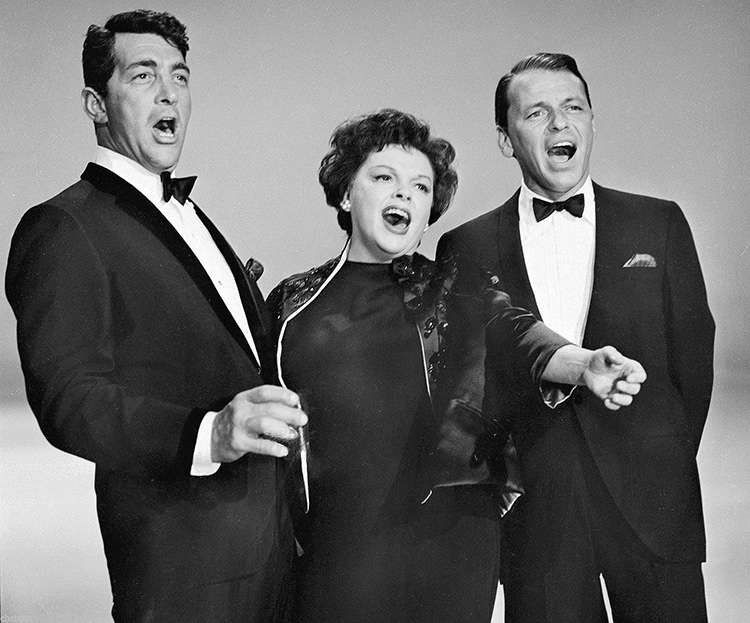
Singing rat packers: Dean Martin and Frank Sinatra bookending Judy Garland in 1962.
. . . . . . . . . . . . .
Garland’s unique and impressive interplay of musicality and lyric interpretation was present in each song throughout the concert. Supported by great arrangements and Mort Lindsey’s orchestra of 40, she used her voice, acting talent, and body movements to successfully convey a wide range of emotions, from sadness to robust joy. Also striking was the audience’s complete silence whenever she sang—unheard of in such a large hall, and an indication of how enthralled her fans were as she performed.
After the final number, there were calls for numerous encores. Garland responded by saying, ‘I’ll sing ’em all, and we’ll stay all night,’ and Myrna Loy stood on her seat and shouted, “Go, baby, go!” At the end, pandemonium broke out as hundreds left their seats and crowded at the lip of the stage, trying to get as close to Garland as possible. After all, this had been a love fest with elements of a revival meeting.
I would never again experience such creative energy coming from a stage, coupled with the powerful, passionate audience response that enveloped me from behind. And I would never again leave a theater so thoroughly intoxicated by the power of artistry at the highest level!
Ellen Freed is a writer, editor, and instructional designer. With Thomas Vietorisz, M.D., she co-authored Recovering Humanity: A Blueprint for Survival.
You may like other articles by Ellen Freed:



